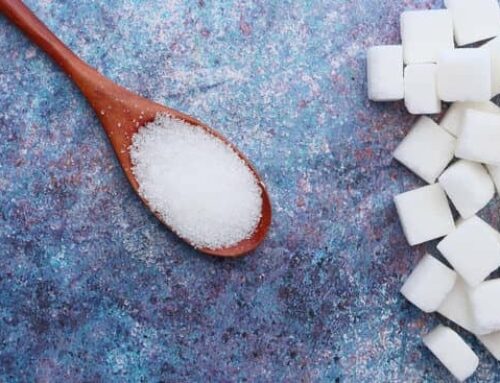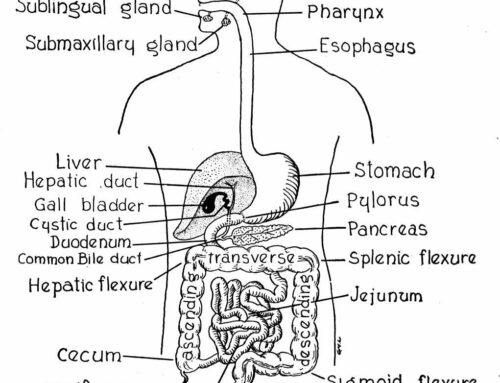I cannot overstate the importance of enzymes to the digestion process. Simply put, enzymes make stuff happen in the body- basically they keep you alive! They are proteins that enhance and accelerate chemical reactions in the body. Since there are many different reactions there are many different enzymes. The human body has more than 55,000 different enzymes! With respect to digestion there are two types that are significant. There are enzymes that are found naturally in real food (food enzymes) and there are enzymes that our body makes to help break down the food we eat (digestive enzymes).
All real food of plant and animal origin contains enzymes. Each raw, uncooked fruit, vegetable, or meat contains enzymes that will digest the food in which they are contained. For example, what we commonly consider as “bruising” on fruits is actually enzymes in action eating up the fruit. There is one small problem with food enzymes. They are easily destroyed by cooking and processing – generally at temperatures above 115°. Since most of the food we eat is cooked or processed that means we have become dependent upon our body to produce sufficient enzymes to digest our food.
While in general we should have sufficient enzymes, there are times we may not. For example, lactose (milk sugar) intolerance is widespread throughout the population. This is because not all humans make or have sufficient amounts of the enzyme lactase required for digesting lactose. Or sometimes we just plain over-eat and our body is not able to produce all the enzymes required within the time allotted.
The main enzymes made by the body are proteases, amylases, disaccharidases, and lipases. Another important enzyme is cellulase which the human body does not manufacture. As you’ll notice, all enzymes end with “ase.”
Proteases digest proteins. They begin their work in the stomach. A protease deficiency can lead to a compromised immune system, fluid retention, constipation, excessive alkaline reserves, and calcium metabolism problems. As I have written previously, one of the dangers of soy protein is that it actually contains protease inhibitors. So, while it is sold and marketed as a protein, which it technically is, the body struggles to digest and utilize it due to the fact it cannot be digested. (Note that fermented soy products such as tempeh and miso are digestible because the protease inhibitor has been broken down by the fermentation process.) Soy mixed with other proteins will also inhibit their digestion. When we discuss the stomach there will be additional information relating to the consequences of insufficient protein digestion.
Amylases digest carbohydrates (starches and sugars) and break them down into disaccharides (sucrose, lactose, and maltose). The disaccharidases further digest these sugars into their simple components called monosaccharides (glucose and fructose). Carbohydrate digestion begins in the mouth and then resumes in the small intestines. Excessive consumption of carbohydrates (sugars) can produce a deficiency of disaccharidases. Some examples of amylase and disaccharidases deficiency include: lactose intolerance causing diarrhea; maltose and sucrose intolerance causing diarrhea and/or constipation; general sugar intolerance leading to asthma and sleep issues. In addition a variety of mental and emotional imbalances such as depression, mood swings, aggressive behavior, panic attacks, and hyperactivity have been linked with deficiencies of these enzymes. Of course in reviewing this list one must discern whether it is the actual lack of the enzyme (such as with lactose intolerance) or the overconsumption of carbohydrates/sugars with a resulting supply shortage of enzymes. Sugar and fructose block Vitamin B metabolism and lack of Vitamin B is also related to the above described mental and emotional issues.
Lipases break down fats. Fat digestion occurs in the small intestine after the gall bladder secretes bile into the small intestines. High cholesterol, high triglycerides, high blood pressure, difficulty losing weight, varicose veins, and diabetes may be signs of lipase deficiency.
Cellulase digests soluble fiber such as cellulose found in vegetables. Ever notice how some raw vegetables may give you gas? While the raw vegetables do contain some cellulase, it may not be sufficient for your body to digest them.
Digestive enzymes are available as supplements and I encourage my clients to utilize them for three reasons: 1. Since enzymes are so critical to digestion; 2. Most of the food we eat is cooked and processed; and 3. Most people eat too much and out of balance. I like to call them “life savers” or insurance for your digestive system.
Bernard Rosen, PhD is a Nutrition Consultant and Educator. He works with individuals, groups, and at corporations to create individualized nutrition and wellness programs. He has offices in Coeur d’Alene, ID. To learn more or to schedule an appointment, e-mail at bernie@brwellness.com, call (414) 771-6570 or go to www.brwellness.com.







